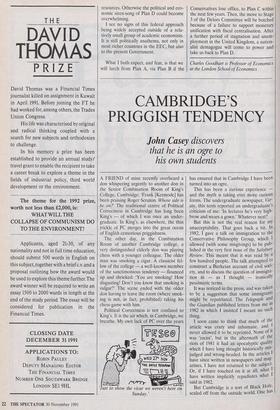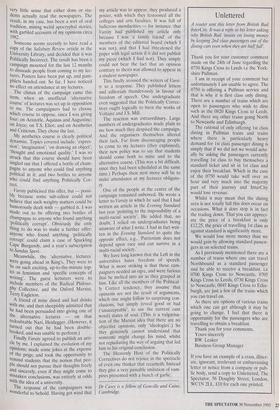CAMBRIDGE'S PRIGGISH TENDENCY
John Casey discovers
that he is an ogre to his own students
A FRIEND of mine recently overheard a don whispering urgently to another don in the Senior Combination Room of King's College, Cambridge: 'Frank [Kermode] has been praising Roger Scruton. Whose side is he on?' The traditional centre of Political Correctness in Cambridge has long been King's — of which I was once an under- graduate. In King's, as elsewhere, the thin trickle of PC merges into the great ocean of English censorious priggishness.
The other day, in the Combination Room of another Cambridge college, a very distinguished elderly don was playing chess with a younger colleague. The older man was smoking a cigar. A classicist fel- low of the college — a well-known member of the sanctimonious tendency — flounced up and shrieked: 'You are smoking! How disgusting! Don't you know that smoking is vulgar?' The scene ended with the older don having to leave the room (where smok- ing is not, in fact, prohibited) taking his chess-game with him.
Political Correctness is not confined to King's. It is the air which, in Cambridge, we breathe. My own lack of PC over the years
`Just to show the vicar we weren't here on Sunday.'
has ensured that in Cambridge I have been turned into an ogre.
This has been a curious experience and the myth is taking ever more curious forms. The undergraduate newspaper, Var- sity, this term reported an undergraduate's criticism of me: 'In lectures he's very high- brow and wears a gown.' Whatever next?
But this is not the real reason for my unacceptability. That goes back a bit. In 1982, I gave a talk on immigration to the Conservative Philosophy Group, which I allowed (with some misgivings) to be pub- lished in the very first issue of the Salisbury Review. This meant that it was read by a few hundred people. The talk attempted to construct a Burkeian account of civil soci- ety, and to discuss the question of immigra- tion in — as I thought — ironically pessimistic terms. It was noticed in the press, and was taken to be a suggestion that some immigrants might be repatriated. The Telegraph and the Guardian published letters from me In 1982 in which I insisted I meant no such thing.
I soon came to think that much of the article was crazy and inhumane, and never allowed it to be reprinted. None of it was 'racist', but in the aftermath of the riots of 1981 it had an apocalyptic quality which I have long thought historically mis- judged and wrong-headed. In the articles I have since written in newspapers and mag- azines, I have not returned to the subject- Or, if I have touched on it at all, what I have written implicitly repudiates what I said in 1982.
But Cambridge is a sort of Black Hole, sealed off from the outside world. One has
very little sense that either dons or stu- dents actually read the newspapers. The result, in my case, has been a sort of oral tradition, mixing weird apocryphal stories, with garbled accounts of my opinions circa 1982.
Someone seems recently to have read a copy of the Salisbury Review article in the University Library, and decided that it was Politically Incorrect. The result has been a campaign mounted for the last 12 months to dissuade people from coming to my lec- tures. Posters have been put up, and pam- phlets handed out. So far, I have noticed no effect on attendance at my lectures. The climax of the campaign came this term, when an unofficial 'alternative course' of lectures was set up in opposition to me. The campaigners had to choose which course to oppose, since I was giving four: on Aristotle, Aquinas and Augustine; on Joyce; on T.S. Eliot; and on Aesthetics and Criticism. They chose the last.
My aesthetics course is clearly political dynamite. Topics covered include: 'expres- sion'; 'imagination"; 'on drawing an object'; thought and emotional quality.' I was so struck that this course should have been singled out that I offered a bottle of cham- pagne to anyone who could find anything Political in it; and two bottles to anyone who could find anything Politically Cor- rect.
Varsity publicised this offer, but — possi- bly because some sub-editor could not believe that such weighty matters could be humorously dealt with — garbled it. I was made out to be offering two bottles of champagne to anyone who found anything Politically corrupt'. Obviously the only thing to do was to make a further offer: anyone who found anything 'politically corrupt' could claim a case of Sparkling Cape Burgundy, and a year's subscription to Sunday Sport.
Meanwhile, the 'alternative lectures' were going ahead in King's. They were to be on such exciting, up-to-the-minute top- ics as feminism and 'specific concepts of Writing'. The guest lecturers were to Include members of the Radical Philoso- phy Collective, and the Oxford Marxist, Terry Eagleton.
A friend of mine dined and had drinks with me, and then sheepishly admitted that he had been persuaded into giving one of the alternative lectures — on that redoubtable Nazi, Heidegger. (However, it turned out that he had been double- booked, and was unable to perform.) Finally Varsity agreed to publish an arti- cle by me. I explained the evolution of my opinions; made some jokes at the expense of the prigs; and took the opportunity to remind students that the notion that peo- ple should not pursue their thoughts freely and sincerely, even if they might come to mistaken conclusions, was entirely at odds with the idea of a university. The response of the campaigners was wonderful to behold. Having got wind that my article was to appear, they produced a poster, with which they festooned all the colleges and arts faculties. It was full of ludicrous mendacities — for instance, that Varsity had published my article only because I was 'a family friend' of the members of the editorial board (which I was not), and that I had threatened the paper with legal action if it did not publish my piece (which I had not). They simply could not bear the fact that an opinion contrary to theirs was allowed to appear in a student newspaper.
This finally aroused the writers of Varsi- ty to a response. They published letters and editorials thunderously in favour of freedom of speech. One undergraduate even suggested that the Politically Correc- tives ought logically to burn the works of Voltaire and J.S. Mill.
The reaction was extraordinary. Large numbers of undergraduates made plain to me how much they despised the campaign. And the organisers themselves altered their tack. Far from discouraging people to come to my lectures (they explained), their new policy was to say that students should come both to mine and to the alternative course. (This was a bit difficult, since they had been scheduled at the same time.) Perhaps their next move will be to make attendance at my lectures obligato- ry. One of the people at the centre of the campaign remained unbowed. He wrote a letter to Varsity in which he said that I had written an article in the Evening Standard last year 'pointing to the impossibility of a multi-racial society'. He added that, no doubt, I relied on undergraduates being unaware of what I write. I had in fact writ- ten in the Evening Standard to quite the opposite effect, e.g., 'Patriotism does not depend upon race and can survive in a multi-racial society.'
We have long known that the Left in the universities hates freedom of speech. What is more striking is that these cam- paigners needed an ogre, and were furious that he melted into air as they grasped at him. Like all the members of the Political- ly Correct tendency, they assume that opinions are not the result of arguments, which one might follow to surprising con- clusions, but simply reveal good or had (`unacceptable', to use the current cant word) states of soul. (This is a vulgarisa- tion of the Marxist idea that there are no objective opinions, only 'ideologies'.) So they genuinely cannot understand that someone might change his mind, whilst not repudiating the way of arguing that led him to his original conclusion.
The Heavenly Host of the Politically Correctives do not rejoice in the spectacle of even one thinker that recanteth. Instead they give a very passable imitation of vam- pires presented with a bunch of garlic.
Dr Casey is a fellow of Gonville and Caius, Cambridge.











































































 Previous page
Previous page